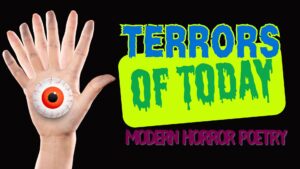Players by Lee Murray
six players assembled to play
a traditional game of cloak and dagger
on the table, token representations
pawns of all colours, players as young as eight
you’ll be the cook, they decide
and someone’s wife, since you’re a woman
they’ll have the titles and the brains
the reverent, the professor, a retired colonel
the girl goes first, throwing you a look
then, bold as brass, the army man advances
no one suspects the reverent
who takes full advantage of the secret passage
after that, everyone takes their turn
the usual suspects, they corner the girl
face-down on the deck, her fate sealed
each player keeping his tally on the sheets
scarlet screams from the conservatory
while, unperturbed, the plummy lecturer
ambles back to his library, confident
he has friends on the Board
still, she might tell; reveal their identities
the professor is the first to accuse her
because that’s how they roll, isn’t it?
painted Scarlet, she has nowhere to turn
except they don’t see you in the kitchen
in your cloak of old-lady invisibility
and they’ve forgotten the poison
that vial relic of an earlier time
in the end, play lasts less than an hour
each of them turning a lovely shade of blue
Author’s Statement
The initial inspiration for this poem came from Blood Games: A Vampire Anthology (Nightshade Publications), edited by Gabrielle Faust, where, among some incredibly powerful dark fiction and poetry, I first encountered Linda D. Addison’s stunning 2013 poem, “The Contest of Inescapable Misdirection”, which blends sword & sorcery, and gaming to produce a devastatingly effective vampiric instructional poem. [The poem comprises far more than this one-sentence synopsis. If you are a fan of horror poetry and you have not yet read Addison’s poem, definitely check it out as it is a masterclass in structure and metaphor.] Anyway, after I put the book down, I couldn’t stop thinking about Addison’s poem, so in the same way that singing a different song helps to clear your head of an earworm, I decided would try my hand at writing my own horror poem using a popular game as my source material. I chose the iconic murder mystery game, Cluedo (US Clue), first produced by UK’s Waddington in 1949. Before I wrote the poem, I played the board game again with my family one evening (I lost), then I did a deep dive into the history of the game. Did you know that certain characters, such as Captain Brown, Lord Grey, and Mrs White (the cook), are no longer part of the modern game? Early releases also included additional murder weapons, such as a bomb, a cudgel, an axe, or poison, and alternate rooms where the murder might take place such as a gun room and a cellar. (Personally, I’m not sure why the game’s makers elected to eliminate the cellar. Let’s face it, all good murders happen in the basement. It’s the first place I’d look for a murderer.) Finally, I chose the theme for my poem, taking as my starting point the patriarchal naming of the game pieces, where the games’ male characters are given titles representing positions of authority and power whereas the female characters are given titles which reveal their relationship to men: Mrs or Miss (or in the past Madam). This is where the modern horror comes in: drawing on the language of the game, the poem that evolved explores how men in positions of power (including educational, military, ecclesiastical roles) are able to abuse young women with impunity, closing ranks to protect one another and using gaslighting and shaming to avoid accountability for their acts and to ensure women’s silence. The male game pieces reveal their true colours! It’s much like a real-life scenario playing out currently on the world stage, involving players in powerful positions, among them a prince and president, many with a decades-long legacy of preying on little girls, possibly even as young as eight. The final two stanzas of the poem provide that element of hope that always accompanies horror, in which the predators get their just desserts—per the rules of the game, of course. While I hope that in real life the men involved are held accountable and the young women are acknowledged for the trauma they have endured, I also hope that the poem serves as a call to action to all the invisible women on the board to harness whatever powers they might have to protect the innocent. Overall, although my poem has none of Addison’s finesse, I was satisfied with the final result and delighted when the HWA judges selected it for last year’s poetry showcase.
About Lee Murray
Lee Murray ONZM is a writer, editor, poet and screenwriter from Aotearoa New Zealand, a Shirley Jackson Award and five-time Bram Stoker Award® winner. A USA Today bestselling author with more than forty titles to her credit, including novels, collections, anthologies, nonfiction, poetry, and several books for children, Lee holds a New Zealand Prime Minister’s Award for Literary Achievement in Fiction, and is an Honorary Literary Fellow of the New Zealand Society of Authors. Among her recent works are feature film Grafted (directed by Sasha Rainbow), horror anthology This Way Lies Madness (Flame Tree Press) co-edited with Dave Jeffery, and prose-poetry collection, NZSA Cuba Press Prize-winner Fox Spirit on a Distant Cloud (The Cuba Press). Read more at https://www.leemurray.info/


